英语lesson2 Period Two
2020版高中英语北师大版必修一讲义:Unit 3 Period Two Lesson 2 Parties
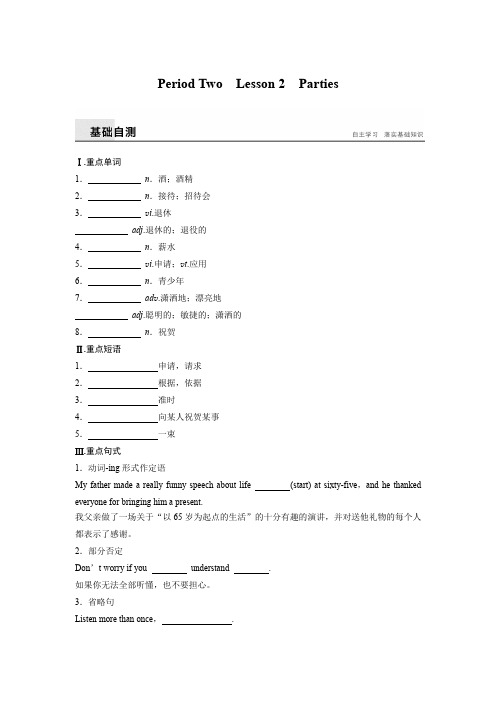
Period Two Lesson 2PartiesⅠ.重点单词1.n.酒;酒精2.n.接待;招待会3.v i.退休adj.退休的;退役的4.n.薪水5.v i.申请;v t.应用6.n.青少年7.ad v.潇洒地;漂亮地adj.聪明的;敏捷的;潇洒的8.n.祝贺Ⅱ.重点短语1.申请,请求2.根据,依据3.准时4.向某人祝贺某事5.一束Ⅲ.重点句式1.动词-ing形式作定语My father made a really funny speech about life (start) at sixty-five,and he thanked everyone for bringing him a present.我父亲做了一场关于“以65岁为起点的生活”的十分有趣的演讲,并对送他礼物的每个人都表示了感谢。
2.部分否定Don’t worry if you understand .如果你无法全部听懂,也不要担心。
3.省略句Listen more than once,.如果可能的话,多听几遍。
重点词汇1.There were twenty other people applying for the job!另外还有二十个人来申请这份工作apply v t.应用,运用;v i.申请,请求;适用apply (to...) for...(向……)申请……apply A to B 把A应用/涂抹于Bapply to sb./sth.适用于某人/某事apply oneself to (doing) sth.集中精力做某事;专心致志做某事(2)application n.申请;应用(3)applicant n.申请人[语境助记](1)When the time came to make the final decision for a course,I decided to apply for the one that reflected my interest.(2016·浙江)当最后决定选一门课程时,我决定申请那门反映我兴趣的课程。
三年级英语第2课
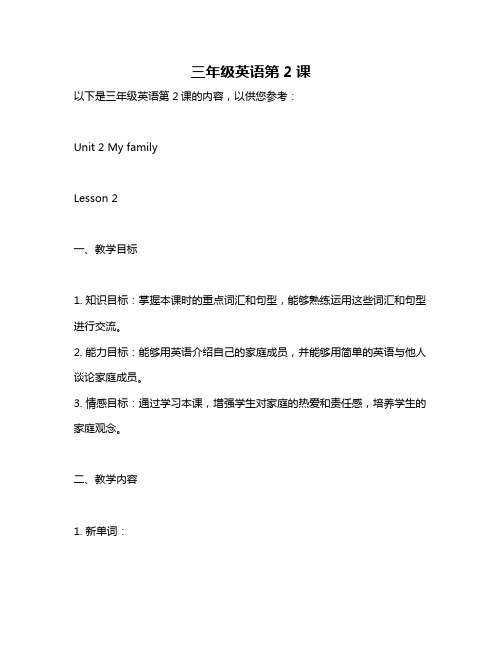
三年级英语第2课以下是三年级英语第2课的内容,以供您参考:Unit 2 My familyLesson 2一、教学目标1. 知识目标:掌握本课时的重点词汇和句型,能够熟练运用这些词汇和句型进行交流。
2. 能力目标:能够用英语介绍自己的家庭成员,并能够用简单的英语与他人谈论家庭成员。
3. 情感目标:通过学习本课,增强学生对家庭的热爱和责任感,培养学生的家庭观念。
二、教学内容1. 新单词:爸爸 father妈妈 mother叔叔 uncle阿姨 aunt姐姐 sister哥哥 brother妹妹 younger sister弟弟 younger brother儿子 son女儿 daughter2. 新句型:This is my family. These are my family members.Who’s that man/woman? He/She is my father/mother. Who’s that boy/girl? He/She is my brother/sister.Is he/she your father/mother/brother/sister? Yes, he/she is. No, he/she isn’t.三、教学重点与难点重点:掌握本课的重点词汇和句型,能够熟练运用这些词汇和句型进行交流。
难点:能够正确区分不同的家庭成员关系,如堂兄弟姐妹、表兄弟姐妹等。
四、教具和多媒体资源1. 投影仪和PPT课件;2. 图片或实物教具;3. 教学卡片。
五、教学方法与手段1. 激活学生的前知:通过提问学生家庭成员的情况,激活学生的前知。
2. 教学策略:采用讲解、示范、模仿、游戏等多种教学方法,引导学生积极参与课堂活动。
3. 学生活动:组织学生进行小组讨论、角色扮演等活动,提高学生的口语表达能力。
4. 教学手段:利用多媒体资源,如PPT课件、图片等,帮助学生更好地理解教学内容。
高中英语 (新版)北师大版高中英语必修一Unit2 Lesson2 1st Period 课件
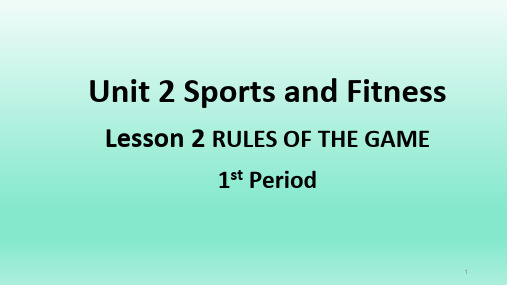
Lesson 2 RULES OF THE GAME
1st Period
1
Make a guess about what sport it is.
It is a game played on a court by two teams who hit a ball back and forth over a high net with the hands, each team trying to return the ball before it touches the ground.
Boxing 1.You can’t hit anywhere ___b_e_l_ow__t_h_e_b_e_lt_. 2.You can’t _ki_c_k,_b_i_te_o_r_p_u_s_h___the other person,
6
Read the rules. Match them with the sports.
Is there a rule that is different from others?
rules of watching sports
WheAn pthlaeyebramll iussitnbpoluanycoertihf ea bpalallyaesr hisesoerrvsihneg,mdoovensotdochwenerthoer
cheer or talk loudly.
( a ) The team may touch the ball no more than three times
before sending it back.
( b ) You can’t hit anywhere below the other person’s belt.
新教材高中英语Unit2SuccessPeriod2Lesson1MoneyvsSuccess课件
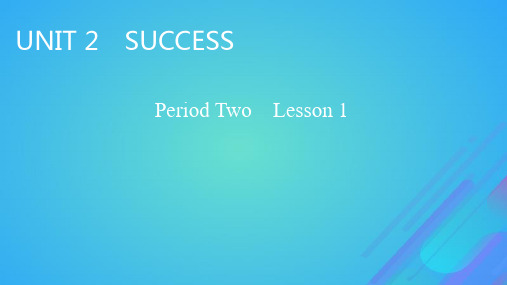
8.死于______d_ie__o_f______ 9.退出____d_r_o_p__o_u_t _o_f ___ 10.挣钱____m__a_k_e_m__o_n_e_y__
¤重点句式
1.(P30)There are certainly no signs ________ Jason is a rich and successful man!(that引导同位语)
( )2.The author sets Jason Harley as an example to ________.
A.sing high praise for him B.explain that there are many millionaires C.show that some people don’t want to be rich D.mean that he is no longer rich now 【答案】C
( )3.From this text we can see that ________. A.Jason Harley is really a foolish person B.Jason Harley doesn’t work hard enough C.Jason must be a lazy person in his work D.great changes have taken place to Jason 【答案】D
【语言提升】 (1)symbol n.象征,标志;符号 a symbol of sth.某物的象征 White has always been a symbol of purity in Western cultures. 在西方文化中,白色一向象征纯洁。 The dove is a universal symbol of peace. 鸽子是和平的共同象征。
江苏省启东市教研中心八年级英语上册 Unit 2 Period 2教案+学案+配套练习 牛津版

8A Unit2 Period 2 Reading I (教案)教学目标:1. Know the school lives in British school and American school.2. Learn to read and understand the article with different ways of reading.3. Learn how to understand the writer’s opinion.教学重难点:1. Know the meanings of the new words: mixed, together, subject, myself, tasty, meal, guy(s), twice, softball, practice, buddy, senior, hero, close, article, admire2. Understand the meanings of the phrases: in Year 8=in Grade 8,a mixed school, Home Economics, learn how to do sth, do sth for oneself, cook healthy and tasty meals, bring in, a Reading Week, the end of sth, as well, take a bus, twice a week, spend time doing sth, learn about, help sb with sth, each other, have a great time doing sth.3. Catch the main information about Lives in a British school and an American school.教学工具: recorder and computerPart One预习作业&预习交流:A.检查学生预习单词情况(个别读且纠正——集体读——巩固中点单词)B.重要短语1.在八年级2.读书周3.在………快结束时4.和某人说话5.上驾驶课6.开心得做某事7.在某方面帮助某人 8.开车送某人去C.预习作业交流(小组核对——集体校对——质疑交流)Fill in the blanks1. They learn how to cook ________ (卫生的) tasty meals.2. We want to read our _________(朋友们的).3. Our school is a _______ (members of both sexes) school.4. The meal he did is very ________ (delicious).5. They don’t know how to look after ________ (oneself).6. They have their own ________ (hero).Part Two交流展示&点拨提高Step I. Lead-in(1) Review the British and American words in different forms.(2) Act the dialogue between Hobo and Eddie.Step II. Pre-taskNow we know the differences between some words in the USA and the UK, then do you want to know the differences between the British school life and the American school life? First, Let’s look at some pictures, what are they doing?Use the pictures on Page 26 to teach some new words. Ask: What are they doing in the pictures?(Reading Week, driving lesson, Home Economics class, lunchtime, buddy club, softball game) Step III. While-taskT: Eddie thinks school is like watching TV. Now John and Nancy are talking about their lives in school. Let’s see if it is like watching TV.Life in a British schoolTask 1 Read Paragraph 1 and answer:1. What grade is John in?(In Year 8.)2. Is it a school for boys? (No, it’s a mixed school.)3. What’s his favorite subject? (Home Economics)4. What can he cook? (Healthy and tasty meals)Task 2 Listen to the tape and read after it.Use Questions 1-4 to sum up Paragraph 1.Task 3 Read Paragraph 2 and answer:5. Does he have a Reading Week every year?6. What books can they read ?7. What can they do near the end of the reading class?8. Why does he think the reading week is too short?Point out: as wellTask 4 Listen to the tape and read after it.Use Questions 5-8 to sum up Paragraph 2.Task 5 Practice the new words and phrases more.Read John’s composition together/by themselves.Life in an American schoolTask 1 Read Paragraph 1 and answer:1. How old is Nancy? Where does she study?2. How old is her brother? What did he learn last year?3. Is it great that Denver drives her to school? Why?Task 2 Listen to the tape and read after it.Use Questions 1-3 to sum up Paragraph 1.Task 3 Read Paragraph 2 and answer:4. How often does she play softball? (Twice a week.)5. Where does she go every Monday? ( A buddy club.)6. Who is her buddy? (Teach: senior)What can they do there?7. What does Nancy think of Julie? Why?Task4 Listen to the tape and read after it.Use Questions 4-7 to sum up Paragraph 2.Task5 Read Paragraph 3 and answer:8. Does she have a good time during lunchtime?9. What do they sometimes do after school?Task6 Listen to the tape and read after it.Use Questions 8-9 to sum up Paragraph 3.Task7 Read Nancy’s article by themselves and try to sum it up.Part Three 检测反馈:单项选择( ) 1. Nancy ’s younger brother is a ___________ boy.A. seven-years-oldB. seven-year-oldC. seven year oldD. seven years old( ) 2. Reading week is too short because we want to read our friends’ books ______.A. alsoB. eitherC. as wellD. too( ) 3. _______ he goes to school, but he seldom goes to the library.A. Some timeB. SometimesC. Some timesD. Sometime( ) 4. He always helps me ______ my English.A. withB. toC. inD. does( ) 5. We always _________ with each other in the Spring Festival.A. have a great time talkingB. have wonderful time to talkC. have many time to talkD. have much time talkingPart four: Homework(1) Read the two articles carefully and try to sum them up.(2) Finish the exercises.8A Unit2 Period 2 Reading I (学案)学习目标:1. Know the school lives in British school and American school.2. Learn to read and understand the article with different ways of reading.3. Learn how to understand the writer’s opinion.学习重难点:1. Know the meanings of the new words: mixed, together, subject, myself, tasty, meal, guy(s), twice, softball, practice, buddy, senior, hero, close, article, admire2. Understand the meanings of the phrases: in Year 8=in Grade 8,a mixed school, Home Economics, learn how to do sth, do sth for oneself, cook healthy and tasty meals, bring in, a Reading Week, the end of sth, as well, take a bus, twice a week, spend time doing sth, learn about, help sb with sth, each other, have a great time doing sth.3. Catch the main information about Lives in a British school and an American school.学习工具: recorder and computerPart One预习作业&预习交流:A检查学生预习单词情况(个别读且纠正——集体读——巩固中点单词)B重要短语1.在八年级2.读书周3.在………快结束时4.和某人说话5.上驾驶课6.开心得做某事7.在某方面帮助某人 8.开车送某人去C预习作业交流(小组核对——集体校对——质疑交流)Fill in the blanks1. They learn how to cook ________ (卫生的) tasty meals.2. We want to read our _________(朋友们的).3. Our school is a _______ (members of both sexes) school.4. The meal he did is very ________ (delicious).5. They don’t know how to look after ________ (oneself).6. They have their own ________ (hero).Part Two交流展示&点拨提高一.快速阅读&整体理解课文A. Life in a British schoolTask 1 : Read Paragraph 1 and answer:1. What grade is John in?2. Is it a school for boys?3. What’s his favorite subject?4. What can he cook?Task 2 Listen to the tape and read after it.Use Questions 1-4 to sum up Paragraph 1.Task 3 Read Paragraph 2 and answer:5. Does he have a Reading Week every year?6. What books can they read ?7. What can they do near the end of the reading class?8. Why does he think the reading week is too short? Task 4 Listen to the tape and read after it.Use Questions 5-8 to sum up Paragraph 2.B. Life in an American schoolTask 1 Read Paragraph 1 and answer:1. How old is Nancy? Where does she study?2. How old is her brother? What did he learn last year?3. Is it great that Denver drives her to school? Why? Task 2 Listen to the tape and read after it.Use Questions 1-3 to sum up Paragraph 1.Task 3 Read Paragraph 2 and answer:4. How often does she play softball?5. Where does she go every Monday?6. Who is her buddy?What can they do there?7. What does Nancy think of Julie? Why?Task4 Listen to the tape and read after it.Use Questions 4-7 to sum up Paragraph 2.Task5 Read Paragraph 3 and answer:8. Does she have a good time during lunchtime?9. What do they sometimes do after school?Task6 Listen to the tape and read after it.Use Questions 8-9 to sum up Paragraph 3.Task7 Read Nancy’s article by themselves and try to sum it up.Part Three 检测反馈:单项选择( ) 1. Nancy ’s younger brother is a ___________ boy.A. seven-years-oldB. seven-year-oldC. seven year oldD. seven years old( ) 2. Reading week is too short because we want to read our friends’ books ______.A. alsoB. eitherC. as wellD. too( ) 3. _______ he goes to school, but he seldom goes to the library.A. Some timeB. SometimesC. Some timesD. Sometime( ) 4. He always helps me ______ my English.A. withB. toC. inD. does( ) 5. We always _________ with each other in the Spring Festival.A. have a great time talkingB. have wonderful time to talkC. have many time to talkD. have much time talking改写句子1. We enjoyed ourselves at the party last night. (改为同义句)We ________ ________ ________ ________ at the party yesterday last night.2. They also like their own schools (改为否定句)They ____________ their own school __________.3. I’m in 9th grade. (改为同义句)I’m in ________ _________.4. I spend a lot of time practicing English. (改为同义句)It _________ __________ ___________ to ____________ English.5. My brother drives me to school every day. It is faster than taking a bus. (改为同义句)My brother ___________ me to school _________ _________ every day.__________ a car is faster than taking a bus.找出错误并在横线上改正1. I like learning how cook and sew. ( )__________A B C D2. Because the reading week is very short, so we can’t finish all the reading.A B C D( )__________3. I play football twice for a week. ( )__________A B C D4. Our teacher is having a lesson and we are listening to her. ( )__________A B C D5、I often help him learns Maths. ( )__________A B C D阅读文章,回答下列问题SchooldaysAlice Andrew was very worried about her son, John. He was often unhappy.One morning she walked into his room, turned on the light, and said: “It’s time to get up, John. You can’t stay in bed all day.”John turned over in bed. He did not want to get up. He turned off the light.“Don’t go to sleep again,” Alice said. “Get up now, or you will be late again for school. It’ s almost eight thirty.” She turned the light on again.“There’s no hurry. I’m not going to the school. The teachers bully me and the students don’t like me.“I’m sorry to hear that,” his mother said: There are two reasons. First, you are thirty-five years old. Second, you are the school headmaster.1. From the story, we know John is an _______ student very often.2. 对画线部分提问。
Unit 8 Lesson 2第2课时示范教案【高中英语北师大版必修第三册】
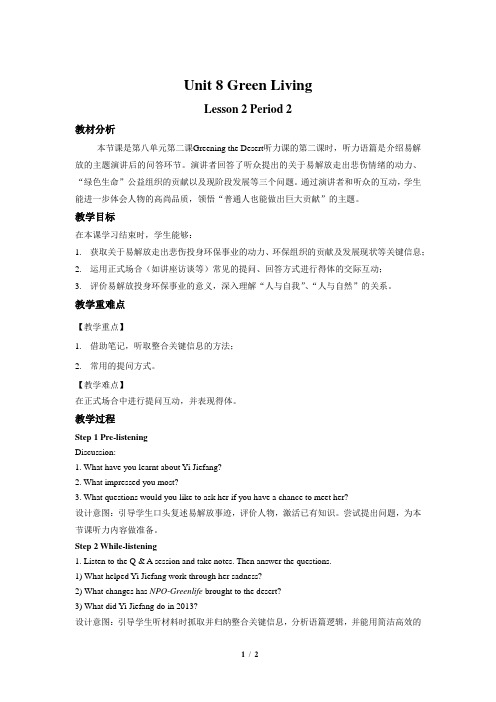
Unit 8 Green LivingLesson 2 Period 2教材分析本节课是第八单元第二课Greening the Desert听力课的第二课时,听力语篇是介绍易解放的主题演讲后的问答环节。
演讲者回答了听众提出的关于易解放走出悲伤情绪的动力、“绿色生命”公益组织的贡献以及现阶段发展等三个问题。
通过演讲者和听众的互动,学生能进一步体会人物的高尚品质,领悟“普通人也能做出巨大贡献”的主题。
教学目标在本课学习结束时,学生能够:1.获取关于易解放走出悲伤投身环保事业的动力、环保组织的贡献及发展现状等关键信息;2.运用正式场合(如讲座访谈等)常见的提问、回答方式进行得体的交际互动;3.评价易解放投身环保事业的意义,深入理解“人与自我”、“人与自然”的关系。
教学重难点【教学重点】1.借助笔记,听取整合关键信息的方法;2.常用的提问方式。
【教学难点】在正式场合中进行提问互动,并表现得体。
教学过程Step 1 Pre-listeningDiscussion:1. What have you learnt about Yi Jiefang?2. What impressed you most?3. What questions would you like to ask her if you have a chance to meet her?设计意图:引导学生口头复述易解放事迹,评价人物,激活已有知识。
尝试提出问题,为本节课听力内容做准备。
Step 2 While-listening1. Listen to the Q & A session and take notes. Then answer the questions.1) What helped Yi Jiefang work through her sadness?2) What changes has NPO-Greenlife brought to the desert?3) What did Yi Jiefang do in 2013?设计意图:引导学生听材料时抓取并归纳整合关键信息,分析语篇逻辑,并能用简洁高效的方式做笔记。
三年级上册英语教学设计- Unit2 第2课时∣人教新起点

三年级上册英语教学设计- Unit2 第2课时∣人教新起点本篇教学设计针对三年级上册英语第二单元的第二课时,采用人教新起点的教材,课时时间大约为45分钟。
本节课的主要内容是学习单词“pen”和“pencil”,并能够简单地用英语描述它们和颜色的搭配。
教学目标通过本节课的学习,学生能够:1.能够正确识别和读出单词“pen”和“pencil”;2.能够用英语描述它们的颜色搭配,如“black pen”或“red pencil”等;3.能够在实际场景中进行语言运用,并形成一定的语言感受。
教学准备1.教材:人教新起点三年级上册英语第二单元教材;2.工具:黑板、彩笔、学生练习本、纸张和笔;3.教具:卡片、贴纸等。
教学过程步骤一:引入新单词1.教师出示单词卡片,读出单词“pen”和“pencil”,并与学生一起念几遍;2.学生跟读,重点强调正确的发音;3.教师用黑板或各种颜色的笔展示笔和铅笔,让学生看看哪些颜色与它们搭配最好。
步骤二:练习新单词1.教师在黑板上画出两个图案:“a pen”和“a pencil”;2.教师向学生展示红、蓝和黑色等三种颜色的贴纸,然后请学生找到正确的颜色贴在图案上;3.学习者可以通过轮流操作的方式进行练习,以更好地理解语言表达。
步骤三:表述句子1.教师先简单向学生展示怎样搭配句子,让他们说出意思;2.具体表述,教师可以跟着每一种颜色贴纸,让学生说出完整的句子;3.学生可以分两人一组练习,以达到真实情境运用的目的。
步骤四:实践应用1.请学生用英语描述自己最喜欢的笔或铅笔,以及它们的颜色搭配;2.学生可以通过练习本来练习自己的语言表达,让教师过程中进行适量的点评;3.在此环节中,教师可以不断鼓励学生,以调动他们学习英语的兴趣。
步骤五:作业请学生回家找一支他们喜欢的笔或铅笔,并在本子上用英语描述它,并划出正确的颜色搭配。
教学评价在本节课中,教师可以通过听、说、读、写和运用等多种方式,实现教学目标。
新概念英语第二册第二课教案
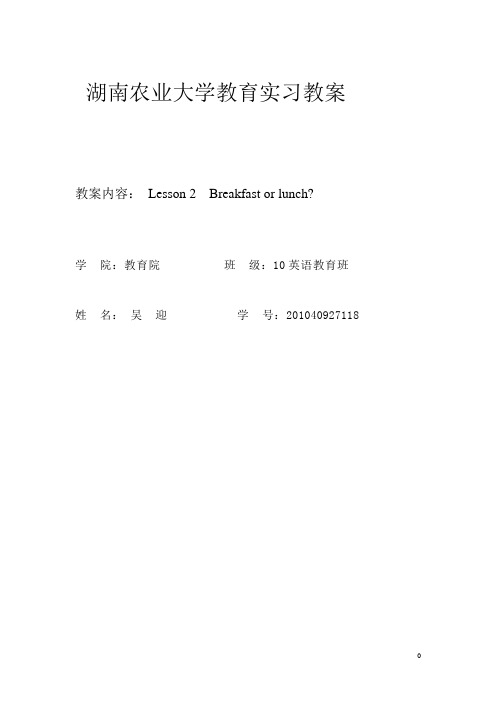
湖南农业大学教育实习教案教案内容:Lesson 2 Breakfast or lunch?学院:教育院班级:10英语教育班姓名:吴迎学号:201040927118Lesson 2 Breakfast or lunch?Teaching Aims and demands:1.Review the usage of Special Question.2.Master the usage of present continuous , and the word ―what‖.3.Grasp the following words and phrases:until, outside, ring, aunt, repeat, get up , stay, look out of, what a day, just then, by train, have breakfast,dear me.4.Learn a kind of word formation by adding affix —affixation5. Practice oral English with the topic ―A great breakfast I have at primary school/university‖.Teaching Content: Text ; Exercises (from Vocabulary to Writing)Teaching Key points and difficult points:1.the usage of present continuous.2.until, ring, repeat, get up, stay, look out of, just then, dear me.Teaching Periods: 6 periodsTeaching Procedures:Period 1-2:Ⅰ. Introduction to the text by asking some questions.Questions:1.Is it hard for you to get up early?2.Do you usually stay in bed very late?3.What time do you get up everyday?4.Do you usually have breakfast in lunchtime? Why?5.Do you remember your last brunch in school?6.Do you think it’s good for your health to have breakfast in lunchtime? Why?7.How do you usually make yourself have breakfast at the right time?8.Can you be an early bird for a month? ―Yes‖ or ― No‖?Ⅱ.Ask students to go through the text and finish the pre-class work to get the main idea of the text. Then analyze the text the general idea .Ⅲ. Explain the text in details.1. until prep. : up to the point in time or the event mentioned.e.g: Until she spoke I hadn’t realized she wasn’t English.You can stay on the bus until London (=until you reach London.)*from morning ~night.※ till (informal)1) conj./prep =untile.g. :Can’t you wait till we get home?2) n. the place were you pay for goods in a large shop/store.*a long queue at the tille.g. :Please pay at the till.3) v. (old use) to prepare and use land for growing crops.Usage Note:Till is generally felt to be more informal than until and is used much less often in writing. At the beginning of a sentence, until is usually used.2.outside1). adv. not in a room,building or container but on or to the outside of it. 在外面,向外面e.g. I’m seeing a patient ---please wait outside.It’s warm enough to eat outside.2) n. The outer side or surface of sth 外部e.g. I didn’t go into the temple---I only saw it from the outside.* At the ~ = at the moment = as a maximum* on the ~ :①Used to describe how sb appears or seemsOn the outside she seems calm, but I know she’s worried.②Not in prionLife on the outside took some getting used to again.3) adj./prep.She has a lot of outside interests (= not connected with her work)They fell cut off from the outside world.(=from other people and from other things that were happening) ~ chance of winning 胜算极小~of = apart frome.g. There was nothing they could do, outside of hoping things would get better.3.ring1) v. (rang, rung)~ sb. upI’ll ring you up later.~ sth. upShe rang up all the items on the till.~ for sth.Could you ring for a cab.~ (with sth.): to be full of a sound. 回想Applause rang through the hall.~ offHe rang off before I could explain.2) n.①give sb a ~: to make a telephone call to sb.E.g. I’ll give you a ring tomorrow.have a ~ of truth 真实可信E.g. His explanation has a ring of truth about it.②circleA key ~E.g. The children sat on the floor in a ring.③JewelleryE.g. A diamond glittered on her ring finger.4 .aunt : the sister of your father or mother; the wife of your uncle.E.g. My aunt lives in Canada.Auntie (= aunty ):Auntie Mary.5.repeat v.1) say/write again.To ~ a question.Do say if I’m repeating myself (=if I have already said this).He’s fond of repeating that the company’s success is all down to him.2) do againThey are hoping to repeat last year’s victory.To ~the class /year/grade(=in a school, to take the class/ year /grade again)重修这门课;重读一年;留级3)happen againHistory has a strange way of repeating itself.Repeatable adj. (usually in negative sentences)Repeated adj. (happening, said or done many times)~ absences from work.Repeatedly adv.E.g. The victim had been stabbed repeatedly in the chest.6 . get up: to stand up after sitting, lying, ect. ; to get out of bed.E.g. The class got up when the teacher came in.Could you get me up at 6:30 tomorrow.7.Stay1) stay in : to not go out or to remain indoorsE.g. I feel like staying in tonight.2)stay up : to go to bed later than usual.E.g. You’ve got school tomorrow. I don’t want you staying up late.3) stay away (from sb /sth): to not go near a particular person or place.E.g. I want you to stay away from my daughter.8.lookE.g. The teacher told us to look at the blackboard.That looks like an interesting film.Glance: take a quick look.E.g. She glanced at her watch during the talk.Gaze :a long steady look at sb/sth.E.g. She felt embarrassed under his steady gaze.Glare : a long angry look at sb/sth.E.g. The old woman glared at him9.Just then: at the momentE.g. Just then, someone knocked at the front door.Just then, my girlfriend drove up and gave me a ride.10.Dear me: used in expression that show that you are surprised, upset, annoyed or worried.E.g. Dear me! What a mess!Dear oh dear! What are you going to do now?11.What a day! =what a day it is ! =>elliptical sentenceE.g. This is a beautiful picture.= What a beautiful picture.She is careless. = How careless she is.12.I’m comeing to see you.Be +Ving +to : used to show that sth is likely to happen very soon or in the future.E.g. I think I’m going to faint.Look at these black clouds--- it is going to rain.15. Word formation-----affixationAdv. –ly(the suffix –ly ,from Middle English, is added to adjectives to form adverbs.)adj. Adv.repeated repeatedlylate latelyPeriod 3-4Ⅳ. Do some oral practice.1.Ask students to retell the story based on the following questions by using theexpressions in the text.Questions concerned:a. Does the writer always get up early on Sunday, or does he always get up late?b.Did he get up early last Sunday, or did he get up late?c.Who telephoned then?d. Had she just arrived by train, or had she come on foot?e.Did he say,’ I’m still having breakfast’, or did he say ,’ I am still in bed’?f.Was his aunt very surprised or not?g.What was the time?2.Topic: A great breakfast I have at primary school/universityExpressions for reference:(great,campus, delicious, roommates, cheap, etc.)(unforgettable, amusing, surprised, various, etc.)Ⅴ. WritingAsk students to write a summary about this text in not more than 55 words.Ⅵ. ConclusionAsk some students to read their summaries and evaluate the best one. Analyze the reasons why his/hers is the excellent.(talk about the skills)Period 5-6Ⅶ. Do some exercises in class and check the answers.1. When Aunt Lucy telephoned _____.A.the writer was asleep.B. the writer was still in bed.C. the writer had already got up.D. the writer was having lunch.2. Aunt Lucy was surprised because_____.A. the writer was having lunch.B. it was one o’clock.C. it was late.D.the writer was having breakfast at lunchtime.3. Write these sentences again. Each sentences must begin with what.a. This is a wonderful garden!b. This is a surprise!c. He is causing a lot of trouble.d. They are wonderful actors!e. She is a hare-working woman.f. You are a clever boy.4. Give the correct form of the words in parentheses.a. he is still _______(sleep).b. It (begin) to rain before she took a taxi.c. When all the guests had left, Derek (arrive).Ⅷ.Assignments :1. Structure& V ocabulary : P192. Writing: An unforgotten day in school.。
Unit2ReadingandThinking课程设计高中英语人教版(2019)必修第三册
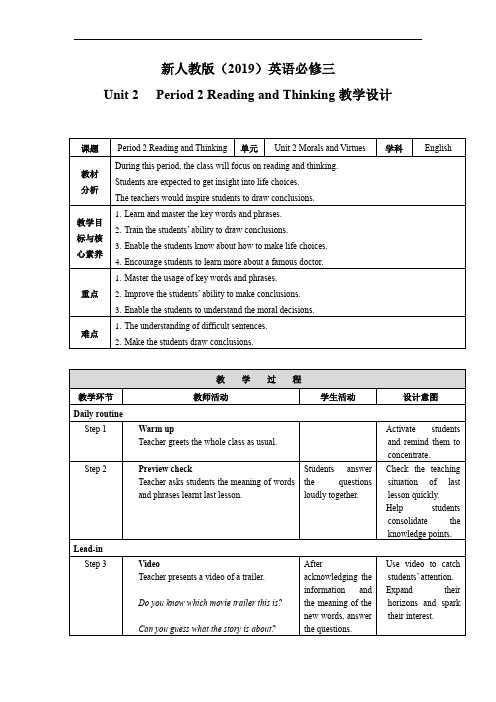
新人教版(2019)英语必修三Unit 2Period 2 Reading and Thinking教学设计课题Period 2 Reading and Thinking单元Unit 2 Morals and Virtues学科English教材分析During this period, the class will focus on reading and thinking. Students are expected to get insight into life choices.The teachers would inspire students to draw conclusions.教学目标与核心素养1.Learn and master the key words and phrases.2.Train the students’ ability to draw conclusions.3.Enable the students know about how to make life choices.4.Encourage students to learn more about a famous doctor.重点1.Master the usage of key words and phrases.2.Improve the students’ ability to make conclusions.3.Enable the students to understand the moral decisions.难点1.The understanding of difficult sentences.2.Make the students draw conclusions.教学过程教学环节教师活动学生活动设计意图Daily routineStep 1Warm upTeacher greets the whole class as usual.-Activate students and remind them to concentrate.Step 2Preview checkTeacher asks students the meaning of wordsand phrases learnt last lesson.Students answerthe questionsloudly together.-Check the teachingsituation of lastlesson quickly.-Help studentsconsolidate theknowledge points.Lead-inStep 3VideoTeacher presents a video of a trailer.Do you know which movie trailer this is?Can you guess what the story is about?Afteracknowledging theinformation andthe meaning of thenew words, answerthe questions.-Use video to catchstudents’ attention.-Expand theirhorizons and sparktheir interest.Step 4New wordsTeacher explains the meaning of the newwords, and asks students to translate themeaning of the whole sentence.She decides to use charts and diagrams toillustrate.=demonstrateThe museum is full of rare and precioustreasures.=valuablemarriagetuition feesscholarshipstaffkindergartenresident physicianclinicHis opinion represents that of the majority.minorityHe complained that his boss was uselessand he had too much work.complaint n.How much would it cost to hire a car for theweekend?give somebody workpay for use of somethingIf that is not what you want, reject themcompletely.=refuserejection n.Seeing that you have no time I have Peterreplace you.replacement n.-Teach the meaning of new words.Step 5Let’s playTeacher choses students to answer the -Familiarize the new wordsquestions.1.The boy who won the _________ was a quite outstanding student.2.When Daniel was five, I took him to the school-bus stop on his first day of _________.3.He _______ his lecture with stories of his own experiences in the field.4.The __________ of the employees have university degrees5.It will take a long time to repair a broken ________.6.This letter is really _______ to me because it's the last one that Pete ever wrote.7.Workers _________ about the conditions in which they are forced to work.8.I was _______ by the first company I applied tokeys: 1. scholarship 2. kindergarten 3. illustrated 4.majority 5. marriage 6. precious 7. complain 8. hired -Clear the tackle of the next step.ReadingStep 6Pair workTeacher encourages students to use the keywords and phrases learnt to discuss withtheir partner about the following topics:Think about this question and share yourideas with your partner: What are someimportant life choices?Important choices a person can make in lifeinclude decisions on university study, jobs,and marriage partners. These choices areimportant because they determine ourfuture.From a wider perspective, however, themost important choices include moraldecisions—how we live our lives and treatothers. Such choices may not necessarilychange our life paths, but they willdetermine how we are remembered byothers, the degree of respect and love we Discuss with theirpatterner and voicetheir opinions.-Familiarize studentswith key words.-Make students usecore words andphrases.-Exercise student’sexpression andspeaking skills.earn, and our own ability to have clean consciences and live with ourselves.Step 7Reading PracticeAnswer the following questions.1.What hard choices was Dr Lin faced withthroughout her life? Underline thesentences about these choices.2.What were the results of her choices?3.What does the author want to illustrate bymentioning Dr Lin's life choices?Keys:1.Underlined sentences:At age 18, instead of following thetraditional path of marriage like themajority of girls, she chose to studymedicine; Dr Lin, however, rejectedthe offer; Thinking of all the peoplestill in need of help, Dr Lin opened aprivate clinic; She was moreinterested in tending patients,publishing medical research on carefor women and children, and trainingthe next generation of doctors.2.She did not get married;she did not stay in the US;she opened a private clinic;she spent her time tending patients,publishing medical research on carefor women and children, and trainingthe next generation of doctors ratherthan government work.3.The author wants to illustrate what itmeans to live a selfless life, caring forothers.Read the text again and answer thequestions. Use the facts and details fromthe text to support your conclusions.What was the main principle guiding Dr Linthrough the choices in her life?What kind of person do you think Dr Lin Follow theteachers thinkingflow and learnsome basicknowledge.after reading finishthe task andvolunteer to voicetheir answer-Learn the basics ofthe text.-Exercise students’skimming skill.-Develop students’team spirit.-Help students betterunderstand thedetails in thispassage.was?Keys:1.The principle was to deny herself, andput others first.2.Lin appeared to have been a verykind woman who was passionateabout helping others.Complete the following sentences using suitable verbs from the text. Be sure to use the correct forms.1.Many studies have shown that shy, passivechildren tend to be socially ____________ by their classmates.2.She was so scared during the interviewthat she completely forgot how she should ____________ to the questions.3.Many Americans ____________ about thesharp increase in the cost of health care and health insurance recently.4.One of the advantages of ____________energetic and positive young people is that they ____________ to show interest in their work and they are eager to learn.5.The student union will hold a specialmeeting in January to ____________ someone to replace the secretary.keys:1.rejected2.respondplained4.hiring; tend5.electStep 8Draw conclusionsAs you read, pay attention to facts anddetails mentioned by the author, and putthem together to draw conclusions about thetopic.Discussion:1.What is illustrated by my choices inlife?Discuss with theirpatterner and thenshare their ideas.-Voice their opinions.-Practice their teamspirit.-Practice theirthinking skill andimagination.-Practice theirspeaking andlistening.2.What is the main principle guiding mein my choices in life?3.Under what principle should I live byin making choices in my life? How willthat change my life?Step 9Difficult sentencesTeacher explains the difficult sentences.To a person nothing is more precious thantheir life, …These words of Dr Lin Qiaozhi give us alook into the heart of this amazingwoman, and what carried her through alife of hard choices.1.nothing is + (形容词)比较级+than …没有什么比…更加…2.句中their相当于his or her。
高中英语Unit17LaughterPeriodTwoLesson2LaughterIstheBe
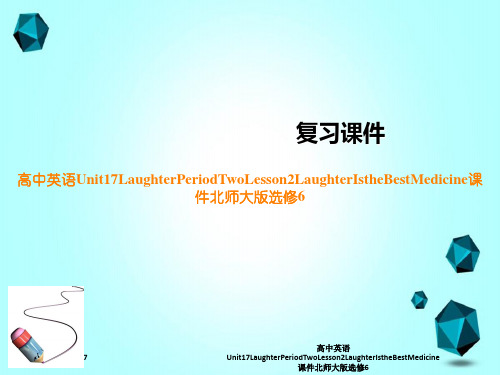
happiness is a total body activity.
我个人认为与高兴相关的笑是纯粹的身体活动。
2021/4/17
高中英语
9
Unit17LaughterPeriodTwoLesso
3.动名词短语作主语 Putting (put) a red nose on while you are stuck in a traffic jam can be a good way of resisting the tension caused by the jam. 当你遇到交通堵塞时,戴上一个红鼻子是抵抗交通堵塞带来 的紧张的一个好办法。
Chinese women's volleyball team. 朱婷被公认为是中国女排最优秀的队员之一。
(2)He acknowledged their help in his speech. 在讲话中,他对他们的帮助表示感谢。
(3) It is widely acknowledged
that students should
同学们,下课休息十分钟。现在是休息时间 休息一下眼睛,
看看远处,要保护好眼睛哦~站起来动一动 对身体不好哦~
2021/4/17
高中英语
17
Unit17LaughterPeriodTwoLesso
[即学即用] (1)Zhu Ting is acknowledged as one of the best players in the
Unit 17
Laughter
2021/4/17
高中英语
2
Unit17LaughterPeriodTwoLesso
Period Two Lesson 2 Laughter Is the Best Medicine
五年级英语下册Lesson 2第二课时 教案 科普版

OK. What road signs do you know now?
Look at my pictures and try to say.
教师可准备几张路标图片,带领学生回顾一下。(可重点强调与let’s learn部分重复的路标,为接下来的学习做铺垫)
共4幅图
Practice-Look, read and choose
Do you know more road signs? Let’s play this game to help the monkey pick up the banana and learn more.
Look at the first road sign, which word is right?
You got it right!
Production-Answer the questions
Turn to page 11, read the dialogue and answer my questions. Look at the first picture, who sits on the empty seat at last, boy1 or boy2?
All right, let’s write the word“shop”here like this.呈现答案
Now, you have 2mins to finish the rest of the words, have a try!
Stop here, let’s check the answers together.
教学设计
课程基本信息
高中英语 Unit 2 Period 2 Lesson 1 The Underdog课时作业

UNIT 2 Period Two题组A 基础练(建议用时:10分钟)Ⅰ.单词拼写1.Tomorrow we shall battle with our old enemies and ________(战胜) them.2.The ________(公司) has increased the price of its cars.3.She has won the title of the world's ________(冠军).4.Many poets and artists have drawn their ________ (灵感)from nature.5.The ________(渴望) for freedom is inherent in us all.6.For a fleeting moment I thought the car was going to ________(猛撞).7.We ________( 聚集) here at a moment of great challenge and great change.8.He put too many things into his ________(包裏).9.The teacher talked to the student very ________(严厉地).10.The ________(额外的) income makes him rich.【答案】1.defeat pany 3.champion4.inspiration 5.desire 6.crash 7.gather 8.pack9.sharply 10.extraⅡ.单句语法填空1.The young girl sitting next ________ me on the plane is very nervous.2.Li Na is considered as the best tennis ________ (play) in the world.3.At that time I ________ (actual) had a $5 and a $10 dollar bills in my wallet.4.Dreams can be a rich source of ________ (inspire) for an artist.5.________(replace) of sugar in your diet can be difficult.6.The plane crashed ________ the mountain, but luckily the pilot survived.7.My friend came to the ________ (gather) that I hosted and bought me a beautiful dress.8.The audience cheered and ________ (clap).【答案】1.to 2.player 3.actually 4.inspiration5.Replacement 6.into 7.gathering 8.clappedⅢ. 完成句子1.The house ________ ________ ________ in the terrible fire has been repaired.那间在大火中被毁坏的屋子已经被重新修好了。
北师版选修9 23-2 Conflict Resolution

Period Two Lesson 2 Conflict ResolutionⅠ.单词自测1.subscribe vi.订阅(杂志或报纸)2.appoint vt.任命,委任appointment n.任命,委任;约定3.union n.联合会,工会4.commercial n.(电视)广告5.nutrition n.营养6.tip n.有用的建议7.possession n.私有物品possess vt.拥有;占有8.contradict vt.反驳,纠正contradiction n.反驳,驳斥Ⅱ.短语自测1.stand_up_for保护,维护2.talk_sth.over_with_sb.与……详细讨论……3.put_forward提议,提出4.from_then_on从那时起,以后5.give_in让步,屈服6.send_for派人去叫……7.call_in请(某人)8.have_a_gift_for有……的天赋9.keep_off减去10.hold_out(在困境中)坚持11.by_and_by不久以后12.call_on要求……介入13.look_down_on看不起……14.keep_one's_word遵守诺言15.come_about发生1.The_first_time she asks her brother to change channels she is patient. 第一次要求她哥哥换频道时,她很有耐心。
2.The worst thing to_do when someone is angry is to be angry back.当有人生气时,最坏的事情就是向对方发火。
1.You subscribe to a magazine and you keep getting it late. 你订阅了一份杂志,你一直很晚才拿到。
[归纳拓展]subscribe vi.订阅;同意,赞成vt.&vi.签名;捐助subscribe to...订阅……;同意……subscribe...to...在……上签……;向……捐……(1)Which journals will the library subscribe_to next year? 图书馆明年会订阅哪些报刊?(2)To my surprise,he did not subscribe_to_my_proposal.令我吃惊的是,他不赞同我的提议。
牛津译林版英语七年级上册Unit2 Let‘s play sports!学讲预案

译林版牛津初中英语七年级上册Unit2 Let's play sports!学讲预案暨导学案英语学科七年级上册Unit 2 Period 1Comic Strip & Welcome to the Unit 学讲预案一.Learning ahead of time (自主先学)散步______________ 的确______________ 碗,盆______________ 次,回______________ 网球______________ 排球______________ 欣赏______________二.Cooperative learning (合作助学)1. 我喜欢散步_____________________2. 擅长打网球______________________3. love playing football_________________4. enjoy swimming ______________________5. I often play football . 我经常在放学后踢足球6. I go swimming . 我每周都去游泳。
7. I my bowl a day. 我每天走到我的碗边许多次。
8. What’s favourite ? 你最喜欢的运动是什么?三.Extensive learning (拓展导学)1.喜爱做某事⑴like doing sth. ⑵doing sth. ⑶doing sth.2.play football 踢足球play 打排球play 打篮球play 打网球play 打乒乓球(注:球类运动前不可加定冠词the。
)3. What about you? 你呢?⑴What about…? = How about…?⑵What about + n. / V-ing. ? 后面接名词或者动名词四. Enhancing learning through testing (检测促学)一)完成短文(每空一词)Everyone has his hobby. Sandy likes playing . Kitty is good at playing . Simon loves playing while Amy enjoys . What about Eddie? He likes . He likes to his a day.二)根据句意和汉语提示填写单词1. He likes playing (排球) very much. He plays it every afternoon.2. Millie goes to the Reading Club three t every week.3. ---What’s your favourite (运动)? ---I like football very much.4. The boy is (真正的) sorry to be late for school this morning.5. Please bring me a (碗) of rice.三)单项选择( ) 1. Millie likes playing .A. a volley ballB. volleyballC. volleyballsD. the volleyball( ) 2. Are you good at pictures?A. drawB. to drawC. drawingD. draws( ) 3. Tony loves very much, so he is very strong.19 / 16A. playing computer gamesB. wearing glasses C playing sports D. eating too much food ( ) 4. --- do you go to the Reading Club? --- After school.A. WhenB. WhatC. WhoD. Where( ) 5. My friend Tom isn’t football field.A. inB. onC. in theD. on the( ) 6. --- often play tennis? --- Yes, we .A. Do you; don’t B Do I; do C. Do you; do D. Does he; does( ) 7. --- good at English? --- No, .A. Are you; I amB. Are you; I’m notC. Is he; he isD. Is she; he isn’t ( ) 8. ---What about this weekend? ---OK. That’s a great idea.A. go swimmingB. going swimmingC. goes swimmingD. goes to swim ( ) 9. Everyone in my family enjoys TV.A. to watchB. watchingC. watchD. watches( ) 10. --- do you watch TV every week? --- Three times.A. How many timesB. How longC. How oftenD. How far四)完型填空It’s Friday. Rick goes to school at eight o’ clock 1 the morning. At 8:30, he has Maths. He doesn’t like Maths. He thinks Maths is 2 . Then at 9:30, he has science. It’s difficult, 3 interesting. He 4 science very much. Then at around 10:30, he has music. That’s 5 favourite subject! Rick eats 6 at school at 12:00. He 7 a P.E. lesson at 3:00 p.m. He likes his P.E. teacher Mr Smith, 8 his classes are funny. 9 school, Rick plays 10 on the playground and goes home at 6:00 p.m.( ) 1. A. in B. at C. on D. /( ) 2. A interesting B. easy C. relaxing D. boring( ) 3. A. and B. so C. but D. or( ) 4. A. like B. want C. likes D. wants( ) 5. A. he’s B. him C. he D. his( ) 6. A. breakfast B. lunch C. dinner D. supper( ) 7. A. has B. have C. goes D. does( ) 8. A. but B. because C. why D. so( ) 9. A. After B. At C. On D. With( ) 10. A. a basketball B. the basketball C. basketball D. basketballs五. Reflection on learning(反思悟学)英语学科七年级上册Unit 2 Period 2Reading (1)学讲预案一.Learning ahead of time ( 自主先学)运动员_____________ 成员______________俱乐部____________ 空闲的______________ 希望_____________ 梦想______________真实的______________ 变为现实__________二.Cooperative learning (合作助学)1.空闲时间______________________2. 成为现实______________________3.一个…的新成员_______________4. 来自于______________________5.看上去很强壮___________________6. 使某人高兴______________________7. want to do ____________________ 8. the next World Cup __________________三.Extensive learning (拓展导学)1. my favourite football playerplayer 作名词,意为“运动员”,是由“动词play + -er”构成的。
2020-202英语北师大版4课件:UnitPeriodTwo Lesson2 ThePapar
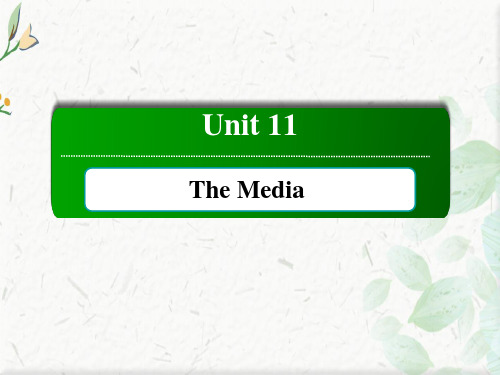
(3)New problems will ____ar_i_se__fr_o_m____ such a situation. 这种状况将会产生新的问题。
(4)写出下列句中 arise 的含义
①Seeing his mother return home, the boy arose from his chair immediately.___起__身_________
②A number of high buildings have arisen where there was nothing a year ago but ruins.__出__现__________
③They arose at sunrise to get an early start to the park.___起__床_________
⑥in __fe_a_r__________ of
⑦in __h_o_no_u_r________ of ⑧in __m_e_m_o_r_y_______ of ⑨in __p_la_c_e_________ of ⑩in __p_o_ss_e_s_si_o_n_____ of ⑪in __n_ee_d__________ of ⑫in __se_a_r_c_h________ of ⑬in __sp_i_te__________ of ⑭in __su_p_p_o_r_t_______ of ⑮in __p_r_a_is_e________ of
- 1、下载文档前请自行甄别文档内容的完整性,平台不提供额外的编辑、内容补充、找答案等附加服务。
- 2、"仅部分预览"的文档,不可在线预览部分如存在完整性等问题,可反馈申请退款(可完整预览的文档不适用该条件!)。
- 3、如文档侵犯您的权益,请联系客服反馈,我们会尽快为您处理(人工客服工作时间:9:00-18:30)。
Period Two
Step One: Lead in
Some Ss volunteers read their homework about favorite food and beverages for different times.
Step Two: Infinitives
1. T writes down one of Ss’ sentences on the board: I like to eat …and points out like is
followed by an infinitive.
2. Ss say other verbs that can be followed by infinitives.
3. (Activity 7) Ss complete each sentence with an infinitive and a noun. Then some
volunteers read their sentences. (Variation: Other Ss may be asked to report the sentences read by the volunteers, so that T can make sure other Ss listen to the volunteers and they are able to use “likes” instead of “like” while reporting, such as Lily likes to eat pizza.)
4. (Activity 8: Wh- Questions) Pair Competition: Ss work in pairs to make the words in
correct orders to make questions. The quicker, the better. Then they ask and answer the questions.
5. (Activity 9: Yes or No Questions) Ss go around the classroom and find Ss do the things
mentioned in the sentences.
Step Three: Be Going To
1. T shows a picture of a boy saying “I’m going to the market”. Then Ss learn the grammar
check.
2. (Activity 10) T tells Ss that there’s something on sale at the Downtown Market. Ss listen to
the audio and fill in the blanks in the picture shown on the screen.
3. Ss practice the conversations with different partners. (mfg coupon = manufacturing
coupon)
4. (Expansion) Ss conclude the common types of coupons.
Step Four: Food Label
1. T shows a picture of a food product. Ss try to understand the ingredients of the food. They
may read the note on Page 32 as a reference. T makes sure they understand the note by asking them questions.
2. Ss try to understand the nutrition facts of the soup. T introduces cholesterol. (g = gram,
mg = milligram)
3. (Activity 12) Ss write the answers to the questions. Then the class checks the answers.
Step Five: Teamwork Task
1. Ss work in groups of four to write a shopping list for a delicious soup.
2. Some groups report their lists.
Step Six: Game Time
Rules:
Begin with “We would like”.
Use a/an for count nouns and some for noncount nouns.
Say as many as possible in ONE MINUTE.
STOP when there is any mistake.
Step Seven: Assignment
Write ingredients of your favorite dish.
教学反思:
本课内容较多,至少要分为两个课时来上。
第一课时围绕不同时间人们所喜爱的不同食品和饮料来学习,让学生在练习中不断使用like to do, be going to do, a/an/some,为后面的学习打下基础。
第二课时围绕做汤的任务,先让学生练习like to do的特殊、一般疑问形式,再练习be going to 的一般、特殊疑问形式。
最后帮学生看懂一罐汤的原料和营养成份,让学生在选择汤的食材时可以加以注意。
